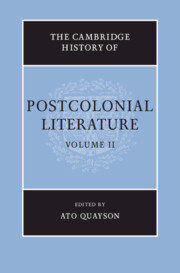Book contents
- Frontmatter
- 21 The language question in India and Africa
- 22 English and the development of postcolonial literature
- 23 Religion and postcolonial writing
- 24 Postcolonial responses to the Western canon
- 25 Island writing, Creole cultures
- 26 Magical realism
- 27 Palimpsest and hybridity in postcolonial writing
- 28 The narrative forms of postcolonial fiction
- 29 Poetry and postcolonialism
- 30 Primitivism and postcolonial literature
- 31 Popular culture and postcolonial literary production in Africa and India
- 32 Film and postcolonial writing
- 33 Fanon, Memmi, Glissant and postcolonial writing
- 34 Negritude and postcolonial literature
- 35 Publishing, prizes and postcolonial literary production
- 36 Key journals and organizations
- Bibliography
- Index
- References
31 - Popular culture and postcolonial literary production in Africa and India
Published online by Cambridge University Press: 28 January 2012
- Frontmatter
- 21 The language question in India and Africa
- 22 English and the development of postcolonial literature
- 23 Religion and postcolonial writing
- 24 Postcolonial responses to the Western canon
- 25 Island writing, Creole cultures
- 26 Magical realism
- 27 Palimpsest and hybridity in postcolonial writing
- 28 The narrative forms of postcolonial fiction
- 29 Poetry and postcolonialism
- 30 Primitivism and postcolonial literature
- 31 Popular culture and postcolonial literary production in Africa and India
- 32 Film and postcolonial writing
- 33 Fanon, Memmi, Glissant and postcolonial writing
- 34 Negritude and postcolonial literature
- 35 Publishing, prizes and postcolonial literary production
- 36 Key journals and organizations
- Bibliography
- Index
- References
Summary
The emergence of popular literature
In 1915, the Gold Coast Nation in colonial Ghana offered the following advice to local readers who wished to see their writing published in the newspaper: ‘A small item about a small man in a small village is not of general interest, whilst scandal, even if it be about the highest in the land, serves no useful purpose and so should not be considered fit for publication.’ The Nation clearly wished to keep its columns free from the textual clutter produced by and about the ‘small man’. Nevertheless, this type of material continued to arrive on the editor’s desk, signalling the existence of ambitious amateur writers and a thriving popular discourse about ordinary people, morals, manners and scandals. For more than a century since then, local authors have produced similar stories, almost always with a problem-solving approach. In much of this literature, writers aim to teach readers – through story, anecdote, advice and confessional – how to interpret other people’s intentions and how to imagine new futures for themselves.
Not all journalists in the early twentieth century were as censorious or prescriptive as the staff of the Gold Coast Nation. In 1903, the editor of the Gold Coast Leader – a newspaper aimed specifically at ‘youth’ in colonial Ghana – tried to stimulate the production of new writing by reassuring shy authors who felt like literary ‘nobodies’.
- Type
- Chapter
- Information
- The Cambridge History of Postcolonial Literature , pp. 1006 - 1038Publisher: Cambridge University PressPrint publication year: 2012



